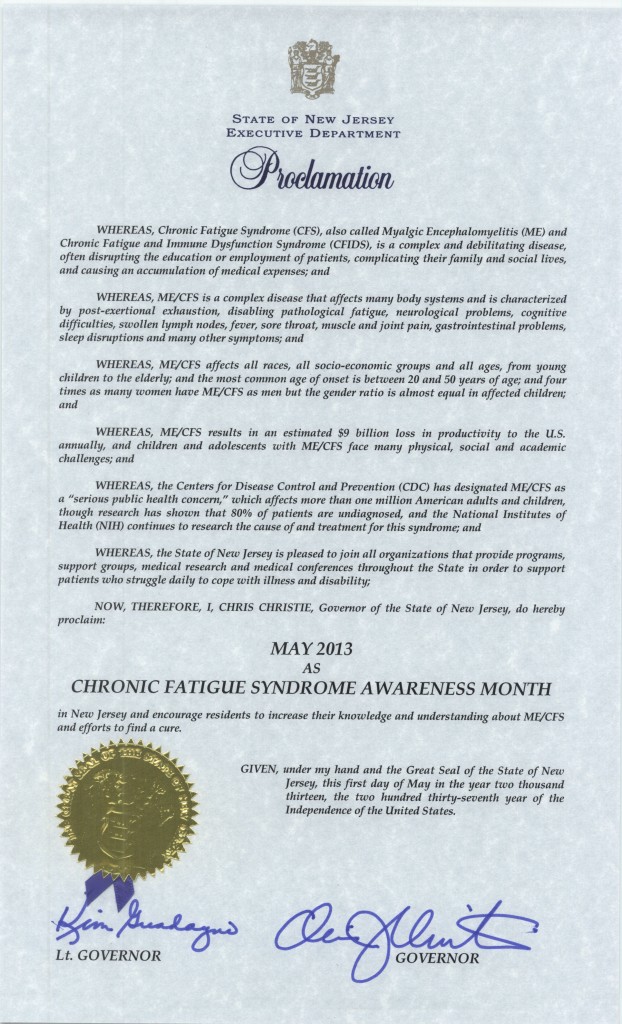Dr. Richard Podell is considering participating in a research study and is seeking potential participants. He has to make a decision within the next two weeks. Below is a letter that he sent me with more details and response options.
Please respond to Dr. Podell by Friday September 13, 2013 to allow him time to evaluate the responses before he makes his decision.
Dr. Podell also wrote:
“This is an important study. It may help make life better for a significant proportion of CFS patients. It’s not a cure, but should help quality of life and ability to function. So far as I can tell, it’s the only FDA approved treatment trial for CFS actually in progress.
My concern is that our office would not be able to obtain the required 25 patients who qualify to participate. Persons taking Cymbalta, Savella, Lyrica or narcotic pain medicines more than 3 times a week are not eligible. As most of my CFS patients also have severe fibromyalgia, FDA’s restriction eliminates a large portion of my patients.
And we are also aware that CFS patients have more sensitivity to medicine side effects than most. Ritalin (methylphenidate)–which is part of the treatment–can cause anxiety, appetite suppression and weight loss. For persons who tend to abuse drugs, it should not be used at all.
The purpose of this letter is to gauge whether or not enough people with CFS would likely be willing to participate. If there is not support from the membership I will not take up this project.
Thank you for your help.
Richard Podell”
Thank you for your consideration.
Pat
Patricia LaRosa, RN, MSN
NJCFSA President
Note: NJCFSA distributes this letter to inform the ME/CFS community about this study. NJCFSA neither encourages nor discourages ME/CFS patients from participating in this study. The decision to participate in this study, or not, is up to the individual.
Dear Pat,
Thank you for helping me contact NJCFSA members.
I need advice to help me decide whether or not to participate in an FDA approved phase II study of a potentially helpful treatment for CFS. I’m on the fence, and will only go ahead if enough people are likely to volunteer for the study. The treatment is a combination of nutrients that help support mitochondrial energy production and methylphenidate (Ritalin). Methylphenidate is most often used to treat attention deficit disorder (ADD) in children and teenagers.
The arguments for helping:
1. Preliminary studies with CFS and with HIV patients are encouraging. The nutrients plus methylphenidate help a substantial proportion of patients. The benefit of both together is said to be much greater than either treatment alone.
2. So far as I can tell this is the only FDA approved trial of a treatment for CFS that currently exists. It would be very sad for all of us if they can’t carry through.
The arguments against:
1. FDA requires that the study be limited to people who have CFS without the complicating issue of having to take certain medicines to treat chronic pain. Persons on Cymbalta, Savella or Lyrica are not eligible. Persons who take narcotic pain medicines such as Percocet more than 3 times a week are also not allowed. These restrictions narrow the field of who can participate.
2. Ritalin/methylphenidate can cause side effects of anxiety and reduced appetite. Persons with drug abuse tendency, bipolar disorder, and schizophrenia should not take Ritalin at all. Given these restrictions, would we be able to recruit 25 volunteers for a 12 week long double blind study? Four or five visits would be required at my Summit office? There would be some reimbursement for transportation expenses.
I would like to join the study, but do not want to be start and then find that we can’t enroll enough patients. I have to give the pharmaceutical company an answer within the next two weeks.
I very much appreciate your emailing me your thoughts. Please contact me whether or not think you might personally participate. A no contact vote has to count as a “no”. My private Email address for this study is: richardpodellmd@gmail.com
| Yes, I think there’s a good chance that I’d participate._____Maybe, I might participate if certain concerns were satisfied ______No, I probably would not participate ______
Name: ___________________ telephone (optional) _____________________ |
Thank you for your advice. Richard Podell, M.D., MPH


